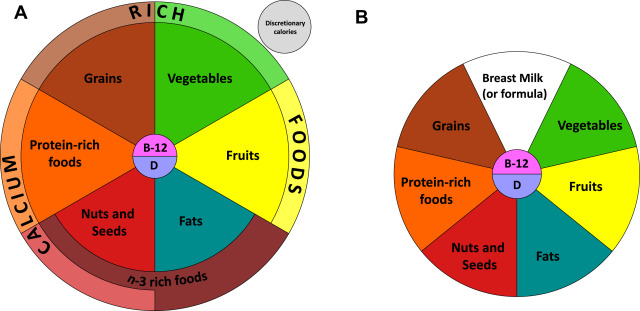当前位置:
X-MOL 学术
›
J. Acad. Nutr. Diet.
›
论文详情
Our official English website, www.x-mol.net, welcomes your
feedback! (Note: you will need to create a separate account there.)
Planning Well-Balanced Vegetarian Diets in Infants, Children, and Adolescents: The VegPlate Junior
Journal of the Academy of Nutrition and Dietetics ( IF 3.5 ) Pub Date : 2019-07-01 , DOI: 10.1016/j.jand.2018.06.008 Luciana Baroni , Silvia Goggi , Maurizio Battino
Journal of the Academy of Nutrition and Dietetics ( IF 3.5 ) Pub Date : 2019-07-01 , DOI: 10.1016/j.jand.2018.06.008 Luciana Baroni , Silvia Goggi , Maurizio Battino

|
V EGETARIAN DIETS, DEFINED as being devoid of flesh foods (such as meat, poultry, wild game, seafood, and their products), are followed by a growing number of people worldwide because of ethical, health, and environmental reasons. Vegetarian diets include a variety of plant-based foods such as grains, legumes, nuts and seeds, fruits, and vegetables, and may or may not include dairy products and eggs. Vegan diets exclude all animal foods. Although for over 30 years we have known that well-planned vegetarian diets, including vegan, are nutritionally adequate and promote regular growth from the early years of human development on, some researchers still discourage parents from raising vegetarian children. This may be at least partially accounted for by the fact that children following very restrictive vegetarian patterns, which limit food choices and calorie intake, have been described. These dietary patterns do not meet the criteria to be defined as well planned, and therefore no conclusions about the growth of children following them should be made. In Italy, 7.1% of the population follows a vegetarian diet (6.2% a lacto-ovovegetarian and 0.9% a vegan diet), a percentage thathasnearlydoubled in the last 5 years. The exact number of vegetarian children is not known, but likely vegetarian parents would raise children following the same dietary pattern. Various Vegetarian Food Guides have been proposed for adult vegetarians since 1997, but so far none specifically for vegetarians aged 6 months to 17 years. Therefore, we designed the VegPlate Junior (VPJ), a Vegetarian Food Guide specific for dietary planning in infancy, childhood, and adolescence, and conceived to meet the Italian, as well as US, Dietary Reference Intakes (DRIs). Diets obtained with the VPJ method meet all the criteria defining a vegetarian diet as “well-planned” and are therefore suitable for promoting thriving and regular growth. These criteria are:
中文翻译:

为婴儿、儿童和青少年规划均衡的素食:VegPlate Junior
素食被定义为不含肉食(如肉类、家禽、野味、海鲜及其产品),由于道德、健康和环境原因,全世界越来越多的人遵循素食饮食。素食包括各种植物性食物,如谷物、豆类、坚果和种子、水果和蔬菜,可能包括也可能不包括乳制品和鸡蛋。纯素饮食排除所有动物性食物。尽管 30 多年来,我们已经知道精心计划的素食饮食,包括纯素食者,从人类发育的早期开始,营养充足并促进正常生长,但一些研究人员仍然不鼓励父母抚养素食儿童。这可能至少部分是由于儿童遵循非常严格的素食模式,已经描述了限制食物选择和卡路里摄入量的食物。这些饮食模式不符合要定义为精心计划的标准,因此不应就遵循这些模式的儿童的成长做出结论。在意大利,7.1% 的人口遵循素食(6.2% 为乳蛋素食者,0.9% 为素食者),这一比例在过去 5 年中几乎翻了一番。素食儿童的确切数量尚不清楚,但素食父母可能会按照相同的饮食模式抚养孩子。自 1997 年以来,已经为成人素食者提出了各种素食指南,但到目前为止,还没有专门针对 6 个月至 17 岁的素食者。因此,我们设计了 VegPlate Junior (VPJ),这是一份专门针对婴儿期、儿童期和青春期饮食计划的素食指南,旨在满足意大利和美国的膳食参考摄入量 (DRI)。使用 VPJ 方法获得的饮食符合将素食定义为“精心计划”的所有标准,因此适合促进蓬勃发展和正常生长。这些标准是:
更新日期:2019-07-01
中文翻译:

为婴儿、儿童和青少年规划均衡的素食:VegPlate Junior
素食被定义为不含肉食(如肉类、家禽、野味、海鲜及其产品),由于道德、健康和环境原因,全世界越来越多的人遵循素食饮食。素食包括各种植物性食物,如谷物、豆类、坚果和种子、水果和蔬菜,可能包括也可能不包括乳制品和鸡蛋。纯素饮食排除所有动物性食物。尽管 30 多年来,我们已经知道精心计划的素食饮食,包括纯素食者,从人类发育的早期开始,营养充足并促进正常生长,但一些研究人员仍然不鼓励父母抚养素食儿童。这可能至少部分是由于儿童遵循非常严格的素食模式,已经描述了限制食物选择和卡路里摄入量的食物。这些饮食模式不符合要定义为精心计划的标准,因此不应就遵循这些模式的儿童的成长做出结论。在意大利,7.1% 的人口遵循素食(6.2% 为乳蛋素食者,0.9% 为素食者),这一比例在过去 5 年中几乎翻了一番。素食儿童的确切数量尚不清楚,但素食父母可能会按照相同的饮食模式抚养孩子。自 1997 年以来,已经为成人素食者提出了各种素食指南,但到目前为止,还没有专门针对 6 个月至 17 岁的素食者。因此,我们设计了 VegPlate Junior (VPJ),这是一份专门针对婴儿期、儿童期和青春期饮食计划的素食指南,旨在满足意大利和美国的膳食参考摄入量 (DRI)。使用 VPJ 方法获得的饮食符合将素食定义为“精心计划”的所有标准,因此适合促进蓬勃发展和正常生长。这些标准是:











































 京公网安备 11010802027423号
京公网安备 11010802027423号